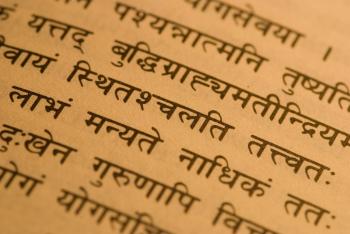 Prof. Fitzgerald (DGS for Sanskrit) retired at the end of the Fall 2018 semester - as such, no graduate students will be admitted for Sanskrit until his successor has been appointed.
Prof. Fitzgerald (DGS for Sanskrit) retired at the end of the Fall 2018 semester - as such, no graduate students will be admitted for Sanskrit until his successor has been appointed.
As part of the Classics Ph.D. program, the Classics Department at Brown offers a Ph.D. track in Sanskrit Language and Literature and a Classics and Sanskrit Ph.D. track as options that allows interested classicists to add a Sanskrit component to their Ph.D. The Sanskrit program is focused entirely upon the Sanskrit language and its literatures, but its fundamental philosophy and approach to scholarship is the same as that of the program in Greek and Roman classics. Texts are examined and interpreted within their broad cultural and historical context on the basis of a rigorous preparation in the study of the Sanskrit language.
Brown University has engaged in the study and teaching of Sanskrit for over a century and was recently under the leadership of the Purandara Das Professor of Sanskrit in Classics, James L. Fitzgerald, a scholar of ancient Indian religions, literatures, and philosophies. He was joined by Lecturer David Buchta, a scholar of Sanskrit literature, Indian philosophy, and the Pāṇinian tradition of grammatical analysis.
